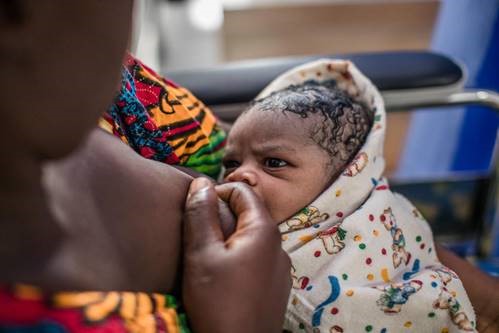By Miski Abdi
Building a healthier planet starts with the simplest of actions and requires us all. Even the smallest members of society have a powerful role to play. Mothers and their young infants might seem to some like the unlikeliest of actors in the global climate change efforts, but they are and have been powerful contributors for some time. What is their contribution, you ask? It is single most effective intervention in the prevention of child deaths under-five – breastfeeding. This World Breastfeeding Week we celebrate breastfeeding’s often overlooked and undervalued environmental benefits.
Breastfeeding versus business
To fully grasp the environmental impact of breastfeeding, we need look no further than its comparative performance against formula milk. While breastfeeding uses few resources and produces minimal to zero waste, formula milk clocks-up high water usage, produces more waste and greenhouse emissions. However, these findings are to be expected, as breastmilk is the ultimate natural renewable resource. Rich in nutrients and antibodies – and delivered straight from the source.
Despite these benefits, businesses are aggressively pursuing and marketing formula milk at a great human and environmental cost. False claims, misinformation and aggressive marketing are endangering children’s lives everywhere. While the production, packaging and transportation costs of formula milk is harming the planet. A 2019 study revealed that the “methane product from livestock”, such as the cattle to produce the milk in formula milk, “is second only to the production by the oil and gas industry”. It concluded that breastfeeding for six months could save an estimated 95-153kg of CO2 emission per baby compared to formula feeding , which in the UK alone “would equate to taking between 50,000 and 77,500 cars off the road each year”. This is truly a staggering potential that’s being lost.
Supporting mothers to adjust to the new COVID realities
Globally, only 42.2% of infants are exclusively breastfed in the first six months, which falls short of the 2030 global target of 70%, and less than half newborns are breastfed in the first hour of life. This picture is far from rosy here in the UK. We have some of the lowest breastfeeding rates in the word, with eight out of ten women stopping before they want to. To try to explain this disparity, I asked my sister, who runs a Baby Friendly children’s center in London. She explained that among the biggest barrier to breastfeeding in the UK is the lack of feeding spaces in common areas, highlighting the taboo and stigma attached to breastfeeding in public. Further, many women struggle to maintain breastfeeding as they transition back to work due to varying degrees of support from employers.
Now imagine what COVID-19’s impact on breastfeeding rates could be. I suspect it would be far from favorable. Many agencies have shared reports of mothers fearing the risk of transmitting the virus through breastfeeding. Yet the World Health Organization has been clear in its guidance for continued breastfeeding, emphasizing that the many benefits of breastfeeding outweigh the potential risks and it is not safer to give infant formula milk.
Unlocking the full power of breastfeeding can help create healthier populations and a healthier planet. What’s needed now is “a warm chain of support” to create “an enabling environment that empowers all women/parents to breastfeed optimally”. As we mark the Year of the Nurse and Midwife, undeniably the greatest links in any existing warm chain of support, we must acknowledge the new complexities and realities that COVID-19 throws at mothers and babies. More than ever before, nurses and midwives are essential in supporting mothers to breastfeed . And with each feed, mothers and babies will continue to the powerful contributors they are in the fight against climate change.
For information on the practical guidance and support available, please read this insightful blog on What does COVID-19 mean for Breastfeeding?
